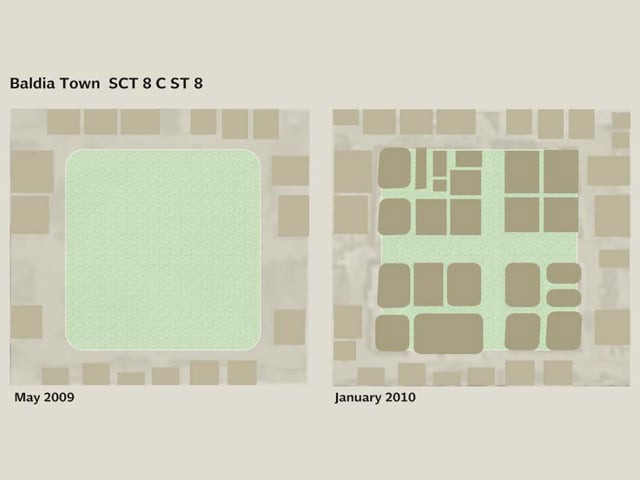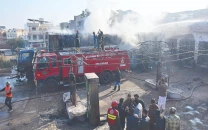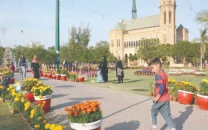As political parties run parks, children are sent home when ‘meetings’ take place
City officials admit land grabbers have a way of working around the laws.

As political parties run parks, children are sent home when ‘meetings’ take place
Within a span of one year — between May 2009 and January 2010 — most of the amenity plots in Baldia, Surjani and Gadap towns have been converted into residential areas, clinics and mosques.
“These residential areas are sold to party workers as a favour and are turned into small ghettos,” said a Shehri member, who could not be named as the NGO’s staff and children have been threatened for pursuing cases like these. “The constant inflow of migrants in Karachi makes these slum areas vulnerable.”
The trend has spread. More and more houses are being built in open spaces in developed parts of Korangi, North Nazimabad and Mehran Town. Construction is taking place in five parks in North Nazimabad, Shehri reports.
What this NGO fears is marginalised ethnic communities using such ghettos as battlegrounds. “Every political party worth its salt is involved in [land grabbing],” said a member of the NGO. “The official consent of the city government is also present in a majority of cases because without its approval, land grabbing cannot happen.”
Visits by this reporter to some of the affected sites more than confirmed the fears of the NGO.
Residents of Bahadurabad have complained that a political party’s activists have occupied Usmania Park, next to Naheed Superstore. As a result of protests, the activists painted over to conceal the party flag, but they are still holding the reins. “These people get angry at the smallest of things and get violent,” said a woman, who lives in the neighbourhood. “But I feel insecure about letting my children go outside.” One time her children were sent back from the park “because a meeting was taking place inside”.
In another instance, these party workers broke a man’s arm after they accused him of spying on their activities. It turned out later that the victim was a new watchman at a house and was waiting to be called in for an interview. In this case too, the activists changed the name of their party office to a ‘residents’ welfare office’ when people complained.
Mehmood Ghaznavi Park in Jamshed Town is also being overtaken by workers from the same party. They have fixed the timings from 4 pm to 11 pm and no one is allowed inside otherwise.
The Jamaat-e-Islami party, whose mayor Niamatullah Khan preceded the Muttahida Qaumi Movement’s Mustafa Kamal, has been keeping an eye on these developments. According to its local government convenor Zahi Saeed, more than 155 parks have been converted either into workplaces for political parties or housing. The problem is so bad that Niamatullah Khan filed a petition in the Supreme Court, questioning whether a public space can be turned into a party office.
On February 2, a full bench of Chief Justice Iftikhar Chaudhry, Justice Khalil-ur-Rehman Ramday and Justice Ghulam Rabbani directed the city government to demolish within 30 days all encroachments and illegal buildings, including government and party offices in Karachi’s parks and amenity spaces. When informed that mosques also existed on these plots, the judges observed that illegally built ones could not be considered legitimate constructions.
Reacting to the JI’s stance, Wasay Jalil for the MQM called this nothing more than “deliberate political victimisation”. He party would fully comply with the ruling of the SC. “We are equally against anything that is against the interest of our city and its people,” he said. The entire issue is being exaggerated, he added, unwilling to agree that there were any resident complaints about encroachments.
For their part, the Pakistan Peoples Party’s Waqar Mehdi reacted by saying that people would always say what they wanted to. “People have pointed fingers at us in the past as well,” he told The Express Tribune when asking about encroachment. “Our party believes in the supremacy of law and if we are found guilty, we won’t question the SC ruling.”
Of much debate these days is the Sindh Public Property Bill (Removal of Encroachment) that made law in September 2010. According to it, a special task force was supposed to throw squatters off government land. “There are many laws for encroachments and more are on their way but the real test is implementation,” said the JI’s Saeed.
According to the official procedure, a governing body of the city government gives permission to convert an amenity plot into a residential or commercial one. It has to be advertised so that public objections can be registered.
The Karachi Building and Town Planning Regulations of 2002 state that “no amenity plot reserved for a specific purpose can be converted or utilised for any other purpose”. But, land grabbers have found a way to work around this. Known as “China cutting,” the land mafia usually has the allotment letter on land conversion backdated to justify the act, explained city land deputy district officer Mohammed Ibrahim.
The anti-encroachment cell has been trying to tackle the menace. It is necessary for a magistrate and an SHO to be present during raids in ‘red zone areas’. “But most of the time the police stalls us or makes excuses,” said Ibrahim. In some cases, the police leak the timings of the raid.
He defended the city government and insisted its officials work with integrity. “There is so much money involved that the mafia can stoop to anything,” he added.
EDO Revenue Roshan Ali Sheikh, who is also the director of the Anti-Encroachment Cell, said that they have managed to free around 3,100 acres from the land mafia within the past three months.
The Sindh Protection and Prohibition of Amenity Plots Bill 2009 was introduced but was deferred in the Sindh Assembly last week. On the surface, it claims to protect amenity plots, but Shehri points out that it does exactly the opposite. It allows MPAs to arbitrarily convert an amenity plot to any other use in section 4. If passed, it would negate the existing protective laws such as Karachi Building and Town Planning Regulations 2002, KDA Order 1957 Sindh Town Planning Act 1915 etc.
Squatting has gone so far that there is no way to stop it, said a Shehri member. “The only way is to implement the law by taking firm action against the perpetrators, irrespective of how big or small the person is. Otherwise, if we stop filing such cases, thinking that no one listens, that would be a bigger mistake.”
Published in The Express Tribune, March 1st, 2011.


















COMMENTS
Comments are moderated and generally will be posted if they are on-topic and not abusive.
For more information, please see our Comments FAQ